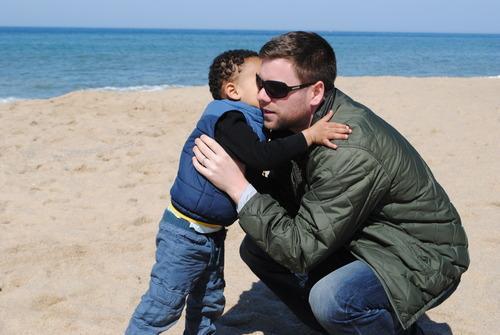7 Things I Can Do That My Black Son Canít
Calvin Hennick
October 27, 2014

The writer with his son. Photo courtesy of Calvin Hennick.
In the days after the Michael Brown shooting, I wrote an essay titled ďI Hope My Son Stays White,Ē detailing my fears about what might happen to my biracial three-year-old son if he grows up to have dark skin. The upshot: America, to its shame, is still a place where black males are feared, and I donít want that fear to turn itself on my son in a way that leads to his arrest or death.
I published the piece on Ebony.com, and the reactions from black readers ranged from ďsad but trueĒ to allegations that I myself was engaging in the very racism and colorism that I was decrying. But buried among these was a comment from a white reader who accused me of ďsucking up to black folkĒ and then went on to list the supposed advantages of being black in America. (Apparently, according to this reader, my son will have an unearned fast track to a career as an air traffic controller. Um, okay?)
I canít help but think that, if the essay had been published in an outlet with a larger white readership, many more commenters would have chimed in to deny the continued existence of racism. In my experience, white people (and straight people, and male people, and Christian people ó all groups of which Iím a member) tend to dismiss the notion that weíre privileged. Itís an uncomfortable thing to acknowledge that youíre the recipient of unfair benefits, especially when those benefits are often nearly invisible to those who receive them.
But when youíre a parent, those privileges stop being invisible. Itís the reason why male congressmen with daughters are more likely to support womenís issues. Itís the reason why Ohio Sen. Rob Portman suddenly declared his support for same-sex marriage after his son came out as gay. And itís the reason why, everywhere I look, I see hassles that my son will have to face that I donít. Hereís a partial list of things I can take for granted, but which will likely be problematic for my son:
1. I Can Walk Through a Store Without Being Followed
To take one high-profile instance, Macyís and the city of New York recently settled with actor Robert Brown, who was handcuffed, humiliated, and accused of committing credit card fraud after buying an expensive watch at the store.
I never have to worry about this happening to me.
2. I Can Succeed Without It Being Attributed to My Race
When my wife, who is black, received her acceptance letter from Boston College, a peer told her she must have gotten in due to affirmative action, effectively ruining the experience of receiving the letter.
When I succeed, people assume Iíve earned it.
3. I Learned About My Ancestorsí History in School
I can tell you all about Louis XIV, Socrates, and the Magna Carta, but I always wondered when we would finally learn about African history (beyond Pharaohs and pyramids). The subject never came up.
4. I Can Lose My Temper in Traffic
Once, an acquaintance who got into a confrontation while driving told me how scared she was of the other driver, describing him as a ďbig black guy.Ē When I get heated, no one attributes it to my race.
5. I Can Loiter in Wealthy Neighborhoods
No one has ever called the cops on me to report a ďsuspicious person.Ē My wife canít say the same.
6. I Can Complain About Racism
When I point out that black people are incarcerated at alarming rates, or largely forced to send their children to underperforming schools, or face systemic discrimination when searching for jobs and housing, no one accuses me of ďplaying the race card.Ē
7. I Can Count on Being Met on My Own Terms
If Iím being treated poorly, I donít stop and think about whether itís due to my race. But unless we somehow make a giant leap forward, my son will always have to wonder.
Recently, I became a father for the second time. My daughter, only three months old, will grow up to face many of the same challenges as my son, on top of the extra ones that come with being a woman: the struggle for equal pay, the catcalling, the constant threat of sexual assault.
I donít want to give my children a complex about all of this, but I canít wish these problems away, either. I canít eliminate all the unfair hurdles that exist in the world. I can only do my best to raise kids who are able to jump over them.